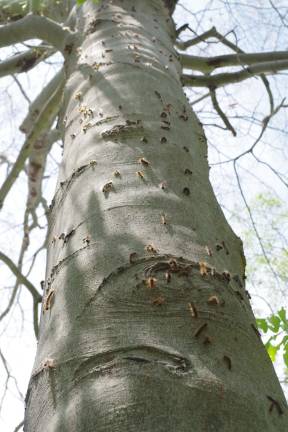Vernon trees attacked by gypsy moth caterpillars

By Nathan Mayberg
VERNON — Leaves are disappearing from trees and invasive gypsy moth caterpillars are to blame.
Scott Ghysels, president of the homeowner's association in Barry Lakes, a private lakeside community in Vernon, said the caterpillars have never been this bad.
Ghysels said he first started noticing something was amiss when caterpillar droppings were falling on his deck.
A walk in the woods sounded like it was raining but it was actually the caterpillars.
In recent weeks, residents have remarked on how the trees in the surrounding Wawayanda State Park are being stripped bare of their leaves.
Ghysels said the magnitude of the problem is "out of our scope," as a property owner's association.
Ghysels has reached out to the state Department of Agriculture for help. He has been told by officials there to contact the Vernon town council.
Township Business Administrator William Zuckerman said at Monday night's council meeting he received a response from the Department of Agriculture which said the agency suggested the property owners use a ground spray to control the spread of the caterpillars. Zuckerman said the dry spring contributed to the infestation as eggs were spread from nearby New York and Pennsylvania. He said the problem should wind down soon.
Lynne Richmond, a public information officer for the New Jersey Department of Agriculture, said the department does aerial surveys each year for gypsy moth infestations, and will do its next one in the fall.
If towns wish to have ground surveys done of gypsy moth damage in their communities, those town councils should send letters to the Department of Agriculture making such requests,
If the Department of Agriculture determines an area should be sprayed, the town must meet certain guidelines following an informational meeting in January.
The spraying of the bacteria Bacillus thuringiensis over affected trees would occur in April.
The town would have to reimburse the state for the cost of the spraying. Richmond said that cost was $54.50 per acre this year.
Richmond says the department has seen more complaints this year about the gypsy moths.
"We have been getting calls from different areas of the state from residents," she said.
The gypsy moths feast on the leaves of the trees. After three consecutive years of leaf eating, the tree will die, Richmond said.
Ghysels said he hopes the state Department of Agriculture will spray in the next year or two to prevent the caterpillar population from exploding again. He said it is too late for this year.
"It's really, really out of hand," Ghysels said.